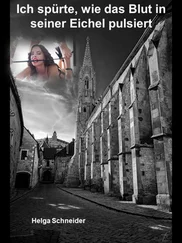‘She isn’t my mother,’ I replied darkly.
‘Anyway, we’re going to take you home,’ the woman said resolutely, and at that moment my stepmother turned up, shouting, ‘So there you are! Might we know where you’ve been hiding? The whole neighbourhood has been out looking for you. What point were you trying to make? None of us has slept a wink, do you realise? You come home right now, and we’ll have a long talk!’ She thanked the others and dragged me away, reprimanding me all the while.
When we got to our flat, Hilde, Ursula’s sister, was there too. I had only seen her twice since we’d been living in Friedrichsruher Strasse. She was six years older than my stepmother and worked at the Ministry of Propaganda. Peter gave me a frightened glance and hid behind a door. I must have looked truly terrible!
Ursula pushed me into a chair and, with Teutonic energy, began issuing orders: ‘You’re going to tell me every last thing! Where have you been? Where did you sleep last night? I nearly called the police! Speak, damn you!’ There were two small red spots at the tops of her cheekbones.
‘I’m hungry,’ was the only thing I could manage to say. My stomach was gripped with cramps, paralysing my mind. ‘I’m hungry too!’ Peter cried out, reappearing from behind the door. But my stepmother dismissed him with unusual harshness: ‘You’ve already eaten, little boy!’ Peter screwed up his mouth and stared at her in disbelief.
‘I think you should give her something to eat,’ Hilde said firmly.
‘Not a bit of it!’ exclaimed my stepmother. ‘First she must speak, the swine!’ And she struck the table with her fist. But I couldn’t think straight. I was so weak that I saw everything double: Peter had four eyes, Hilde two noses. Then Ursula yielded and gave me the usual dishwater that looked like milk and hadn’t even been warmed up, adding a slice of damp bread so thin it was almost transparent.
I ate greedily while my stepmother complained to her sister: ‘I’ve had it up to here, Hilde, I can tell you! This child will be the death of me!’
‘Why don’t you have her analysed?’ Hilde asked, coldly pragmatic. ‘I know a group of child psychologists. Why not consult them? It’s not impossible that the child has problems, she might need treatment.’ ‘Perhaps you’re right,’ agreed my stepmother. ‘Could you contact them for me?’ Hilde promised she would.
And sure enough, a few days later, my stepmother led me to a building where we were taken to a big room with lots of windows looking out on to a cluster of fir trees. Two doctors, a man and a woman, asked me lots of questions, and asked me to do some drawings. I found it all rather amusing. Less amusing was what my stepmother said afterwards. She informed me that the psychologists had found me to be suffering from an ‘illness’ and that I would have to spend time in an institution, where I would be cured. I never found out what that illness might have been, but a few days later, Ursula packed a small suitcase with my things, left Peter with Frau Gerlinde, gave me a plate of semolina (that set off alarm bells) and announced, ‘I’m taking you to the institution today.’ I started crying, but she was not to be moved.
It was a foggy day, and I was tired. There had been an air-raid, and we had had to dash to the cellar, so we hadn’t slept much. I was frightened and dejected. My stepmother was showing the power she had over me: she could get rid of me by sending me to an institution, and there was nothing I could do about it. We were crossing the little cobbled square in front of Steglitz station when all of a sudden the siren sounded. We ran for the nearest shelter, but at first the people wouldn’t let us in. Then my stepmother started shouting, threatening to tell the Gestapo. They let us in then.
Once the raid was over, we got on a train, though it stopped for two false alarms.
In our compartment there was a group of Hitler Youth who, despite the heavy air-raid, were singing at the top of their voices: ‘A flower blossoms on the moor, its name is Erika!’ They were rumbustious and euphoric, and they radiated a barely imaginable joy.
We got off the train in a part of the city that had been seriously damaged by bombs and, after walking for fifteen minutes, arrived at a large black door set in a stone wall with barbed wire running along the top. A uniformed woman with a threatening expression snapped, ‘Papers!’, then let us into a foggy courtyard that echoed with the furious barking of a pack of guard dogs.
Through the fog we glimpsed a large, hostile looking building; small windows were hidden behind black grilles, and no smoke issued from the chimney. Just like the building I had drawn a few days previously for the psychologists.
We stopped in front of a large door with spy-holes. A bell rang shrilly inside; someone behind the door stared at us for a long time. It started raining. Within moments we were drenched; my brown hood was as useless as a rag, and my stepmother’s hair, which she had combed carefully, fell into her face like a crumbling pyramid. After a considerable wait we were allowed in.
Ursula asked for information from a woman holed up in a little cage like a captive owl. Two cold eyes scrutinised us. ‘First floor!’ the woman grunted finally. ‘Second corridor on the right, room four! Heil Hitler!’
Our dripping hoods left enormous puddles on the parquet of the entrance hall as we began to climb the stairs. The steps were very smooth, and I slipped and hurt my shoulder quite badly. I cried out, the owl poked her head out of her little cage, and I was suddenly struck by a wave of nausea that was reinforced by a smell of cabbage like a toxic cloud. My stepmother sighed angrily: ‘Why don’t you watch where you put your feet?’
We found the room the owl had directed us to; some women were looking after a group of disabled children: a little blind girl, a little boy waving his arms around and dribbling, two retarded children and a little girl in a wheelchair. I didn’t understand.
We waited for a long time in the freezing room. At last we were seen by a bony old woman with very white hair pulled back in a chignon. She carefully examined the sheets of paper handed to her by my stepmother and finally, after staring at me intensely through her pince-nez, observed, ‘I don’t think this is the right place for your daughter, madam.’ Ursula was clearly annoyed. Her voice grew shrill as she explained that the eminent team of psychologists who had examined me had warmly recommended the institution. Then she lowered her voice and added something that I couldn’t quite hear. The woman started consulting the pieces of paper again, pondered, polished away at her glasses for a long time and said, ‘Fine, madam, I will make an exception and accept your child.’
My stepmother heaved a sigh of relief, for which I hated her. Quivering with gratitude, she went to grip the woman’s hand, but the woman pulled it away abruptly, turned towards her desk, put a cold, dry hand on my head and said, ‘Now it’s time to say goodbye to your mother, Helga. It’s getting late, and I have people waiting for me outside.’ But I turned away from my stepmother so she wouldn’t have the satisfaction of seeing my tears.
The place turned out to be a kind of hell; everything there was unbearable.
It was, in fact, a storehouse for unwanted children, for those who were considered unworthy of belonging to the Aryan race because they were blind, deaf-mute, crippled, paralysed, dwarfs, subnormal and so on. The first thing they did was to shear off my hair as a precaution against lice. Then they made me put on a uniform with black stripes, like the ones worn by convicts. The food was meagre and of poor quality, and the staff were overbearing and icily formal.
Читать дальше












